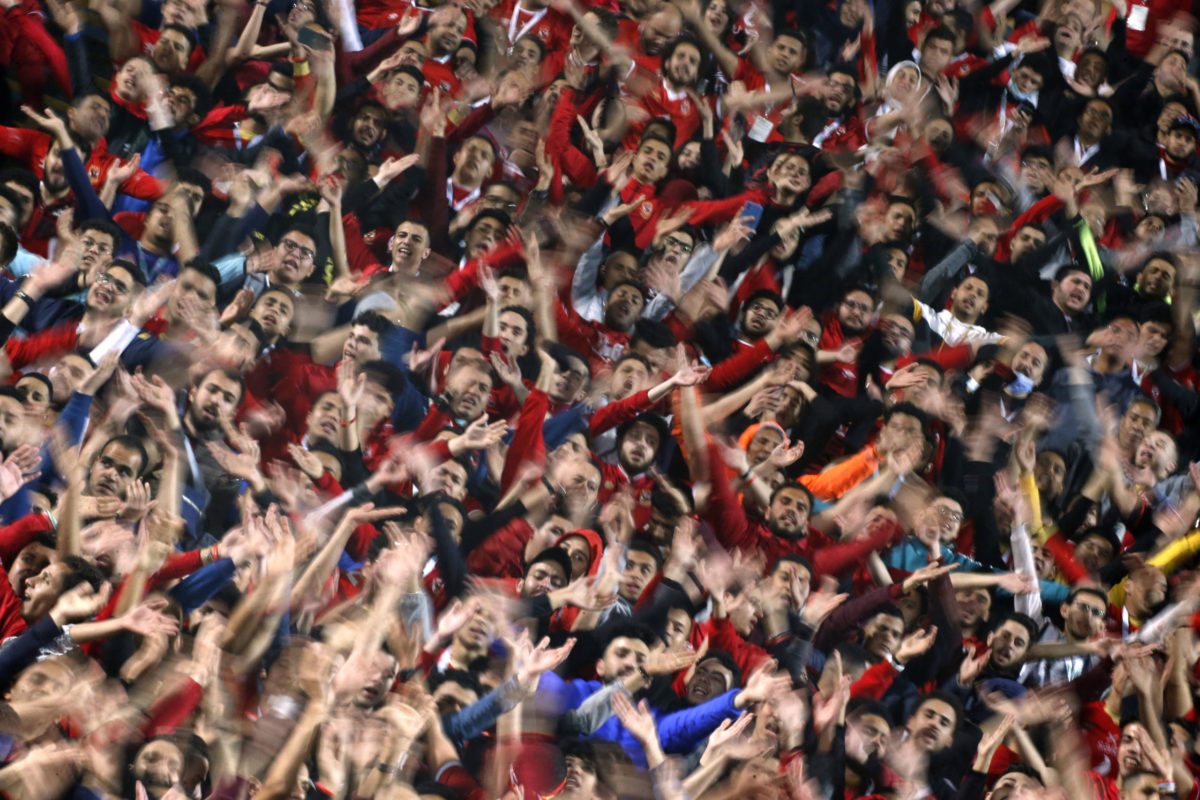
Al-Ahly fans at the African Champions League game between Al-Ahly and Mamelodi Sundowns at Cairo International Stadium, Cairo, Egypt, February 26, 2022. Amr Abdallah Dalsh/Reuters
The tournament relies on the mobility of hundreds of thousands of laborers, athletes, supporters and other professionals to build stadiums, provide infrastructure, enact a spectacle and broadcast it to the world. It transfers unimaginable financial resources among corporate entities, private investors, para-state agencies and sovereign wealth funds. It shifts geopolitical lines of influence, centering host nations and peripheralizing those countries that fail to qualify. It spreads ideas of freedom and fairness, of merit and muscle, of individual self-reliance and collective solidarity—ideas springing from nineteenth century imperial sporting ideologies with indelibly liberal and racist roots.
The 2022 World Cup in Qatar—the first sporting event of such magnitude to be hosted in the Middle East—has drawn disproportionate international scrutiny and controversy. Ruled by the powerful Al Thani family, the tiny state of Qatar hosting one of the world’s largest spectacles has raised eyebrows across the world. Media attention has focused on a range of issues beginning with the circumstances of the host country’s gaining the bid and the corruption charges against the FIFA officials involved. Climate factors and the exceptional scheduling of the tournament for November, in the midst of the European professional football calendar, have also elicited commentary. The majority of the media scrutiny, however, has focused on the living conditions and social rights of migrant workers constructing the tournament venues and on Qatar’s laws regulating alcohol, sexual expression and public behavior—critics accuse the tournament of “sportswashing” authoritarian rule and human rights violations.
Accusations of sportswashing, the practice of using sport to improve a country’s image, have gained currency to explain why Qatar has spent an estimated $220 billion readying the country to host the tournament. In their contribution to this issue, the authors from the collective Habibi FC take up the all-too-easy and one-sided explanation of sportswashing, observing it is most frequently applied to (non-white) countries from the Global South and partakes in a larger discourse of the “West vs. the rest.” They call for a more critical use of the term, one that does not depend on Orientalist binaries and attends to how soft power and diplomatic logics drive countries to host mega sporting events.
In one set of contributions, Natasha Iskander, Jaafar Alloul, Laavanya Kathiravelu, Philip Proudfoot and Ali Reda approach the domestic and international political economies in and through which Qatar and other Gulf countries invest in the international sporting scene. They trace a range of effects that the global capital at the heart of football has on different lives. Hosting a World Cup opens up certain avenues for employment and mobility and forecloses others. It privileges some categories of “expertise” and bolsters the ambitions of particular elite classes at the expense of rivals. Purchasing a professional football club, and its brand, like Manchester City, Paris Saint-Germain or Newcastle United, may constitute a spatial fix for petro-capital, but it may not actually help those who live along the Britain’s post-industrial periphery to “level up.” Who benefits from the international attention these ventures invariably bring? Ruling elites, global investors, local reformers, marginalized groups or some unexpected combination of bedfellows?
Yet, the World Cup is never solely about the host country. The tournament calls forth passions and politics that resonate across space and time. Mahfoud Amara, Chris Cox, Sami Everett, Carl Rommel, Tamir Sorek, Sara Al-Hassan and Deen Sharp track how footballing dreams inspire women and men, athletes and spectators from the Maghreb to Egypt, Palestine, Sudan and beyond. As football matches are in the public eye, they can become salient battlegrounds in the fight for gender equity and ethnoracial inclusion in national projects. Some players become outspoken icons in political struggles, while others carefully navigate a fraught political landscape to preserve their professional employment. When it comes to the fans, organizational dynamics and protest scripts innovated by young male ultras in stadiums have spilled into the streets, inspiring demonstrations and national uprisings for dignity, democracy and social justice. Most football supporters, and most street protesters, are not ultras. Yet the passions remain real, with victories inspiring patriotic sentiment and failures taken as a national reckoning. Such affects transcend individual nation-states, calling forth diasporic identifications and transnational solidarities.
Taken together, the articles in this issue capture how football moves individuals and systems, calls on people to identify with a particular team and what it represents and to align their hopes and dreams with its successes and failures. The 2022 World Cup might be physically taking place in Qatar, but for many around the world, life will stop, or start, when the ball is kicked.
Read the first article in MER issue 304 “Football—Politics and Passions.”
